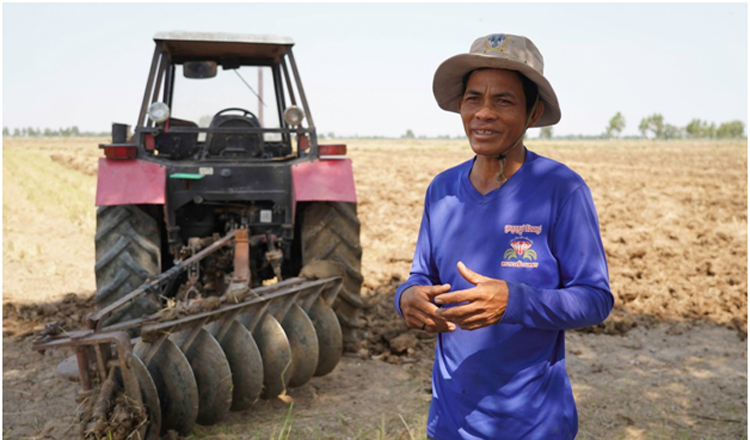Tags
Cambodia’s journey towards sustainable rice production

Squatting to survey his fields, Reung Siroth digs his hands into the moist soil and inspects the black earth at his feet.
He has spent the morning ploughing and harrowing, aprocess of aeration that grinds the field into finely churned particles, which improves soil health after the rice harvest.
Around him, fields are covered in ash, and some smoke still billows from the remains of charred and discarded rice straw. Siroth used to burn his fields, too, sometimes up to three times a year, but that’s since changed.
“Those are the farmers that didn’t get the training,” hesays, gesturing at the neighbouring fields. Rice burning – a traditional practice across Cambodia and much of Asia—clears fields of crop residue, releases greenhouse gases, and has a range of negativeen vironmental impacts.
But Siroth recently learned about sustainable alternatives that maintain soilmoisture and nutrients—and readily made the switch.
This change—as well as others he’s instituted on his two hectare rice eld— has made him eligible to sell hisunmilled paddy to the Battambang Rice Investment Co(BRICo), a nearby rice mill that supplies Mars Food &Nutrition, a global business with some of the world’s leading food brands within Mars, Incorporated.
“Being part of this project is good for the environment,” Siroth said, “but it’s also good for me.”
IFC, with support from the Private Sector Window of the Global Agriculture and Food Security Program (GAFSP) is training farmers like Siroth across Cambodia as part of an advisory services project that aims to improve their farming practices and connect them with international markets that source high-value, sustainable rice.
The program has also provided farmers with quality seeds so that the paddy they produce complies with the Sustainable Rice Platform (SRP) standard for sustainable rice cultivation, a voluntary sustainability standard promoting climate-smart agriculture that supports smallholder farmers, protects biodiversity, and boosts access to high-quality rice.
The training and access to higher quality rice seed create opportunities for Siroth’s family. And amore reliable supply chain is also helping Mars Food &Nutrition, a longstanding IFC partner and leading global food company, make progress towards its sustainability targets.
Mars Food & Nutrition sources most of its rice from farmers who are in the process of working towards the SRP standard.
In the coming years, it’s aiming to increase its volumes of SRP rice from farmers who have completed the process and attained full SRP certification.
IFC partnered with BRI Co, also an IFC client, in 2018 to develop a climate-smart, traceable, and inclusive supply chain for Mars Food & Nutrition. IFC’s support to agricultural cooperatives, which includes training on seed multiplication, pest management, post-harvest practices,climate-smart agriculture and nancial skills, has help edensure that the paddy these farmers sell to BRICo meets Mars’ quality requirements.
The project has also introduced farmers to fragrant jasmine rice, a higher-valuealternative to the plain white rice that many local farmer sroutinely grow. Mars Food & Nutrition sources the fragrantvarieties for its popular Ben’s Original™ rice brand.
Rice, a staple food for Cambodians, is critical to agriculture in the country, and though the sector is growing consistently, trends were disrupted during COVID-19,when shipping costs soared, and the country’s exports dropped by 29 per cent.
According to World Bank estimates, agriculture contributes 22 percent of Cambodia’s gross domestic product (GDP).
IFC has been working in Cambodia’s rice sector since 2011,helping to address ongoing challenges in the supply chain by improving paddy quality, increasing milling efficiency,enhancing food safety and boosting Cambodian rice exports.
In more than a decade of working in the rice sector,IFC contributed to a sixfold rice export increase from100,000 metric tons in 2010 to more than 656,323 in 2023.
Building on that, IFC, with the help of GAFSP, also provide dinvestment funding and technical support to Cambodia’s leading producer and exporter of organic rice, AMRU Rice,which expanded its processing capacity with the establishment of a state-of-the-art rice mill and helped the company adopt sustainable farming standards and practices in its supply chain.
Though the project’s first stage has ended, Mars Food& Nutrition has partnered with IFC for a follow-up project,extending the existing sourcing partnership. The new phase of the project is also providing additional training on income diversication, with a focus on women farmers, and further boosting cooperative management capacity.
For farmers like Siroth, the ongoing partnership is good news. The extra income from last year’s harvest help edcover the family’s school fees, and he’s eager to continue learning new methods. In previous years, Siroth recalls, the ground beneath him was so uneven that water sometimes reached his ankles and sometimes his knees.
Access tolaser levelling for his fields has helped reduce water consumption and ensure more efficient fertiliser use—and is critical to ensuring that his paddy ends up in Ben’s Original™ products in grocery carts on the other side of the world. “I’ve been a rice farmer for 20 years,” he said, “and I’m still learning.” IFC
https://www.khmertimeskh.com/501602102/cambodias-journey-towards-sustainable-rice-production/Published Date: December 4, 2024






